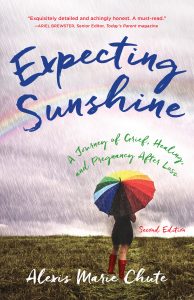 Alexis Marie Chute is an award-winning artist, writer, and filmmaker. She received her Bachelor of Fine Arts in painting and photography from the University of Alberta, and her Masters of Fine Arts in creative writing from Lesley University in Cambridge, Massachusetts.
Alexis Marie Chute is an award-winning artist, writer, and filmmaker. She received her Bachelor of Fine Arts in painting and photography from the University of Alberta, and her Masters of Fine Arts in creative writing from Lesley University in Cambridge, Massachusetts.
Alexis is a highly regarded public speaker and has traveled around the world presenting on art, writing and the healing capacities of creativity. She is widely published in anthologies and magazines, and her artwork has been exhibited internationally. She lives in Edmonton, Alberta, Canada with her husband and their three living children.
Kimberly Maska: Welcome everybody, welcome to Spiritual Biz Chat for Spiritual Biz Magazine, I am your host, Kimberly Maska, and today we have joining us Alexis Marie Chute, an award-winning artist, writer, filmmaker, and author of multi-award-winning memoir, Expecting Sunshine: A Journey of Grief, Healing and Pregnancy After Loss. Welcome, Alexis, and thank you for being with us, how are you doing today?
Alexis Marie Chute: I’m doing great! Thrilled to be here with you, Kimberly.
Kimberly: It’s a pleasure to have you here, and congratulations on the release of your new book “Expecting Sunshine”! Truly, your story may be tragic but yet it is so beautiful and inspiring. Would you mind taking our readers behind that personal journey of yours down the path to your current life’s purpose and work?
Alexis: Absolutely. I have always been an artist, writer, and all-round creative spirit. I did pump the breaks on my work when I started having children. I gave birth to a healthy baby girl my husband and I named Hannah and once she finally slept through the night we thought: we’re ready to do this again! Unfortunately, my next pregnancy did not go as smoothly. About halfway into my pregnancy with my second child, whom we named Zachary, doctors discovered a large tumor around my baby’s heart. He had a random condition that allowed tumors to grow in him, and many people live with this disease, but the tumor around Zachary’s heart was causing him to experience heart failure in utero.
Doctors pressured us to terminate, but my husband Aaron and I held out for a miracle. When I was 30 weeks pregnant, my health began failing and I went into labor. What I believe was my miracle was that Zachary was born alive. He lived a few minutes in my arms where he moved a little, though he never opened his eyes or cried. He died skin to skin with me, resting against my heart. That day I ceased to be one person and became someone new—and I didn’t know who exactly I was for a long time.
Kimberly: What was the turning point in taking the steps and putting your life into the book, pouring your heart into those pages? And what inspired such meaningful cover? What does that rainbow mean to you personally?
Alexis: I call my year after Zachary died my “Year of Distraction” because it was a time where I did everything but process my loss. I worked like crazy in commercial art and took one-year-old Hannah to every activity I could find. It was only when I got pregnant again that I realized I needed to address my grief or I would carry it forever in a destructive way—and I didn’t want that for myself or my family. I canceled all my work commitments and took an intentional approach to grieving.
That was when I started writing Expecting Sunshine, which began as an outlet for all that I was thinking and feeling during that time. It was hard pouring my heart onto those pages. I wrote about my flaws, fears, and ways I felt I had failed my child and myself. The writing was cathartic, though I feel it has been most healing to share the book with people. Helping others has helped me the most.
The inspiration for the book cover is the term: Rainbow Baby. A rainbow baby is what bereaved parents call their child born after their loss. The next child does not replace the baby that died, but his or her life represents hope—a rainbow—on a painful journey of loss. To me, the rainbow after loss represents our human resiliency. We have the desire for hope and pursue joy, which I think is so beautiful and motivating.
Kimberly: The desire to parent a child after loss is immense, and although you were able to become pregnant again, when and how did your real healing begin?
Alexis: My healing began when I chose to face my grief head-on. It was a series of purposeful choices:
- To put my own self-care at a higher priority level than people-pleasing. Some of those things included exercise, sleep, baths, tea, meditation and mindfulness, and counseling. Also, saying no to activities and people, so I could say yes to what brought me joy.
- To create healing and healthy rituals around my grief, like reflecting, planting a tree, looking at photos, talking about Zachary, and writing a blog for parents who have lost a child.
- I also returned to my artmaking and writing. I began painting again and made wood sculpture, something I had never done before. I wrote poetry and prose. I shared my fine art conceptual photos that I took leading up to and following Zachary’s birth and death in community spaces. I began teaching a workshop called Creativity to Heal and Empower.
- I took my grief and healing and used what I learned to help others. I give keynote speeches and teach workshops around the world. I love the opportunity to help others and talk about Zachary, creating a beautiful legacy for him.
Kimberly: Alexis, would you say the following to be true… when a couple loses a child, almost all of the attention is on the woman and the men are often overlooked? What happens to men who lose children?
Alexis: Men are told to “man-up,” “be strong,” “take care of their partners,” and “real men don’t cry.” As a culture, we do not have the tools and vocabulary to support men in the way they need—and believe me, they need it! I did not appreciate my husband Aaron’s grief for a long time. It wasn’t until years of our strained marriage passed that we had a real conversation and I truly saw that he grieved differently from me and I had not been sensitive to the pressures he faced, nor his needs. I was very focused on myself, and—as the mom—the support we received was mostly given to me.
Kimberly: So what are some comforting things can bereaved moms and dads do to help each other and themselves?
Alexis: Bereaved parents—both of them—need support. What that looks like is: family and friends checking-in, and not just the week after the loss, but months and years later. Grief never leaves us. It can be hard to care for our physical needs when our emotions are drained in sorrow. Aaron and I had friends organize a dinner delivery to our house for two weeks—without that, I think we would have eaten pizza every day, we had not energy to cook. Bereaved parents need to know that they will express their grief in unique ways, but they need to give each other permission, time and space for what feels right.
Communication is key for couples during and after a loss. Some people don’t want to talk and others can do nothing else. Friends and family should ask the grieving parents what would be the most helpful way they can offer support. Sometimes it simply means being present, no words or actions required. That might look like a quiet walk in nature, or playing a sport together, or scrapbooking.
I think it’s important for bereaved parents to be encouraged to name their baby that died, take photos, create hand and footprints with ink, save a lock of the baby’s hair, have a memorial, and celebrate the child’s birthday every year. These are positive and healthy actions and are ways parents can incorporate their child and their loss into their life.
Kimberly: Is there a final message you want to let the audience know? Or just any last little words that you have for them?
Alexis: After my loss, I felt so alone and so guilty. I have come to learn that there is a very supportive community of bereaved parents. We do not walk this journey by ourselves. I also found freedom from guilt and pain in acknowledging that death is a part of life and life is a beautiful mystery where there are not always answers to our heart’s why questions—and that’s okay.
I wrote Expecting Sunshine to encourage others who walk this road that grief can make us feel crazy at times, but there are hope and joy in life after loss. And for those who are less inclined to read books, I created Expecting Sunshine documentary film with the same purpose of comfort, encouragement, and education. It is a moving, artistic film.
Kimberly: If our readers wanted to reach you, where can they find you?
Alexis: They can connect with me on my website at www.AlexisMarieChute.com and learn more about Expecting Sunshine at www.ExpectingSunshine.com. Readers can also find me on my favorite social media: Instagram using my handle @alexismariechute
Kimberly: Thank you, Alexis, very much! It has been such a pleasure chatting with you today!
Alexis: The pleasure is all mine! Thank you, Kimberly!
INTERVIEW LINKS
Website: https://www.alexismariechute.com/
Alexis’ Book: https://www.alexismariechute.com/expectingsunshinebook/
Facebook: https://www.facebook.com/AlexisMarieProductionsInc
Twitter: https://twitter.com/_Alexis_Marie
Instagram: https://www.instagram.com/alexismariechute/
Youtube: https://www.youtube.com/user/AlexisMarieChute


